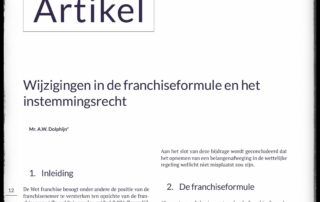Internet in franchise relationships
Mr MSJ Steenhuis – Franchise lawyer
If, in the context of a franchise relationship, the Internet and e-commerce are discussed in order to sell the goods/services of the franchise organization digitally, one enters the territory of the Block Exemption Regulation and more specifically the provisions regarding active and passive sale.
Before discussing in more detail whether or not a franchisee is permitted to also sell the goods/services that he is permitted to sell on the basis of the franchise agreement by means of the Internet, it will first be explained what is meant by the concepts of active and passive sales.
The Vertical Agreement Block Exemption Regulation uses the following definitions.
Active sales means:
approaching individual customers in the exclusive territory or within the exclusive customer base of another distributor on their own initiative, for example by writing to or visiting them directly; approaching on its own initiative a specific customer group or customers in a specific territory assigned to another distributor on an exclusive basis through media advertising or other forms of promotion specifically aimed at that customer group or on the target customers in that area; or establishing a warehouse or outlet in the exclusive territory of another distributor. Passive selling is defined as responding to spontaneous requests from individual customers, including providing goods or services to those customers. General advertising and promotion in the media and on the Internet, which reach customers in the exclusive territories or customer groups of other distributors, but which are a reasonable means of reaching customers outside these exclusive territories or customer groups, for example to within non-exclusive territories or reaching customers within one’s own territory are forms of passive selling.
For distributor, of course, franchisee should be read here.
It can be deduced from the foregoing that the franchisee is permitted to engage in passive sales outside its exclusive territory. This right may not be restricted by the franchisor. It follows from the guidelines just quoted that the Block Exemption Regulation provides that the use of the Internet for advertising or sales purposes is generally regarded as a form of passive selling. The fact that this method of sale can have an effect outside the contract territory is inherent to the technology. If a customer visits the franchisee’s website and then proceeds to purchase goods from the relevant franchisee, this is deemed to be passive sales which cannot be restricted. Internet sales qualify as active sales only if a website is designed primarily to reach customers within the exclusive territory of another franchisee. In any case, sending e-mail messages to individual customers outside the exclusive territory of the franchisee at the franchisee’s initiative is considered active selling. In order to prevent a proliferation of various advertisements from the franchisees on the Internet, it is important that the franchise agreement includes a provision regulating the use of and sales via the Internet. This is also in the interest of the franchisees themselves. After all, one of the advantages of being affiliated with a franchise organization is the uniformity with which it presents itself to the outside world. In our increasingly digital society, a uniform presentation is therefore also important on the Internet.
Many franchise agreements now also include an article regarding the use of the Internet and e-commerce. The purport of such an article could then be that a franchisee acknowledges that the franchisor is the rightful owner of the domain name in which the name of the franchise organization appears and furthermore that it is the right of both the franchisor and the franchisee to distribute the standard range via sell/promote the internet. It should be noted here that a franchisor is allowed to set quality requirements for the franchisee’s internet site.
Mr MSJ Steenhuis is a lawyer in Rotterdam. The law firm Ludwig & Van Dam is specialized in franchising.
Ludwig & Van Dam franchise attorneys, franchise legal advice

Other messages
Mitigation of fine due to ‘dominant position’ of franchisor
Mitigation of fine due to 'dominant position' of franchisor ...
It is a non-competition clause at the end of the lease
In the judgment of 26 March 2024, ECLI:NL:GHSHE:2024:1035, the Court ...
Looking ahead: Bottlenecks at the end of the franchise agreement
Of course, everyone starts a collaboration with good courage. But ...
Not just a successful appeal to incorrect forecasts
Not just a successful appeal to incorrect forecasts Introduction ...
Changes to the franchise formula and the right of consent
An article by Mr. was published in the leading legal ...
The National Franchise podcast
Guests on the National Franchise podcast are: Theodoor Ludwig ...







